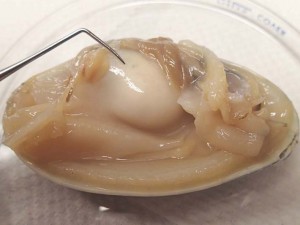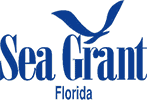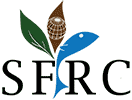Home » Sunray Venus Clams » Project VENUS » Project VENUS Objective 1
 To ensure adequate seed availability for growers to purchase and plant, this project objective incorporates several approaches. First, shellfish hatchery operators are provided with broodstock obtained from first and second generation stocks reared in a previous Florida Sea Grant project and held at the UF experimental lease. To date, over 4,100 adults have been shipped to participating hatcheries. Gonadal development and sex ratios, as well as water temperatures, are monitored over the natural spawning season; this information is provided to hatchery operators. In addition, project funds have assisted these businesses in 2014 and 2015 to modify their facilities to accommodate sunray venus clam seed production. For example, two hatcheries used the funds to purchase a chiller to expand their broodstock conditioning and maturation capabilities. Further, Dr. John Scarpa, formerly of Harbor Branch Oceanographic Institute (HBOI) and now with Texas A&M University at Corpus Christi, has provided on-site visits as needed to assist hatchery personnel with site-specific questions and to review broodstock maintenance, spawning, larviculture, and early juvenile rearing methods.
To ensure adequate seed availability for growers to purchase and plant, this project objective incorporates several approaches. First, shellfish hatchery operators are provided with broodstock obtained from first and second generation stocks reared in a previous Florida Sea Grant project and held at the UF experimental lease. To date, over 4,100 adults have been shipped to participating hatcheries. Gonadal development and sex ratios, as well as water temperatures, are monitored over the natural spawning season; this information is provided to hatchery operators. In addition, project funds have assisted these businesses in 2014 and 2015 to modify their facilities to accommodate sunray venus clam seed production. For example, two hatcheries used the funds to purchase a chiller to expand their broodstock conditioning and maturation capabilities. Further, Dr. John Scarpa, formerly of Harbor Branch Oceanographic Institute (HBOI) and now with Texas A&M University at Corpus Christi, has provided on-site visits as needed to assist hatchery personnel with site-specific questions and to review broodstock maintenance, spawning, larviculture, and early juvenile rearing methods.
All hatcheries have been able to spawn sunray venus from broodstock provided; however, there have been variable results between hatcheries for production of larvae, post-set, and seed. From conversations with hatchery personnel, the major problem in the Cedar Key area over the past two years seems to have been low salinity. Other hatcheries in the state have been able to produce seed over this time period. A post-seed production meeting was held in 2014 to allow hatchery personnel to share their successes and failures in order to identify seed production problems. There was no consensus as to what was the single most important impediment, but the meeting resulted in a summary of problems and potential solutions. Each hatchery may have to determine and overcome its own unique set of problems or research will be needed to identify a solution for each specific problem. Currently, there are several projects funded by HBOI’s Specialty License Plate and Department of Agriculture and Consumer Services in which reproductive patterns, nutritional requirements, and maturation of sunray venus adults are being evaluated.
To obtain broodstock,
contact Leslie Sturmer
at 352-543-5057 or
LNST@ufl.edu.
For technical assistance,
contact John Scarpa
at 361-825-2369 or
John.Scarpa@tamucc.edu.
University of Florida | IFAS
Shellfish Aquaculture Research & Extension
11350 SW 153rd Court I P.O. Box 89
Cedar Key, FL 32625
Phone: (352) 543-5057


